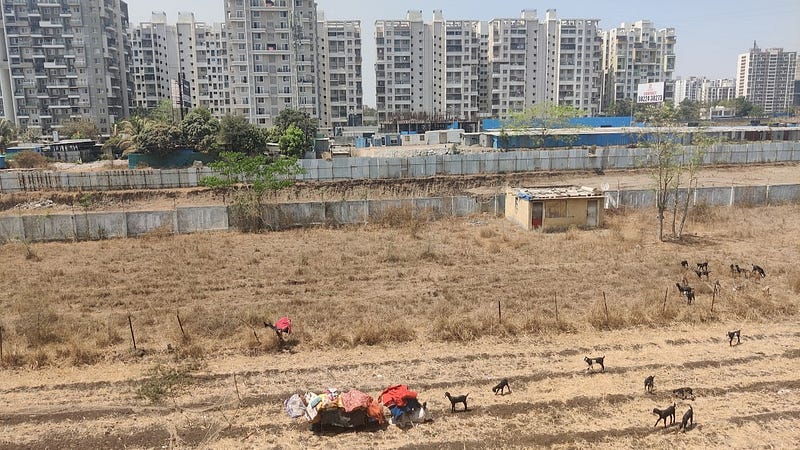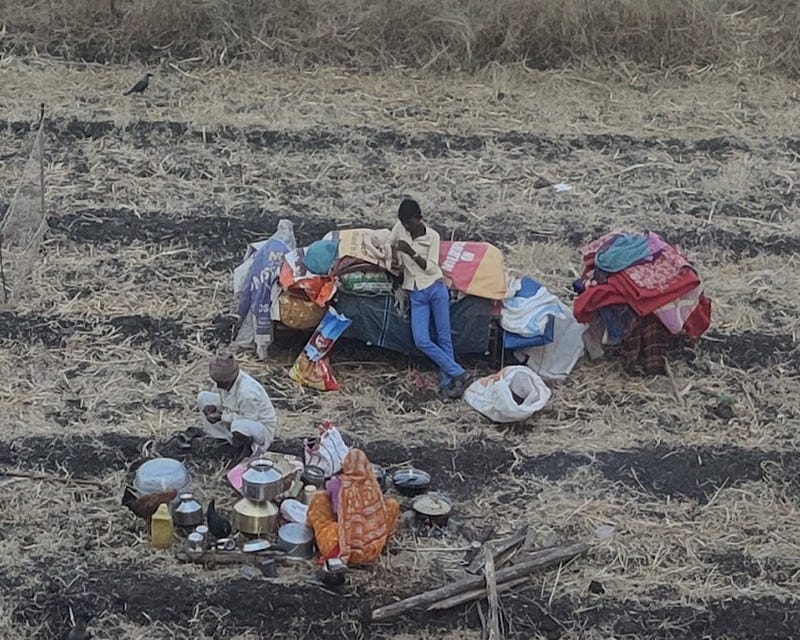
It rained the whole night, and we decided to walk nearby to lift our spirits. Our walk brought us across a pair of horses that belonged to a nomadic pastoral family who had settled near our residence. These horses usually roamed freely, but on this day, they seemed to be standing still and moving slowly, as if their movements were restricted. Upon closer inspection, I noticed that their legs were free but appeared to be mentally restricted. This made me ponder how often we become trapped in our thoughts, reminding me of a similar incident.
My day began early on that particular day. I raced to my office cabin to start my scheduled work. My office space is a beautiful cabin with windows on both sides, providing excellent ventilation. One side of the cabin faces long fields. As usual, I opened the windows and turned on the fan to ventilate the room. Looking out into the dried fields just outside the window, I noticed burnt embers, three brick stones in a circle, and a piece of rag flying in the corner. The nomads had left as quietly as they had come.
A nomadic pastoral shepherd family settled in the fields a few days ago. The woman in the family was not very tall, she wore a large dangling gold nose ring that covered her face, and her weathered appearance bore the marks of enduring harsh winters and heat. I marvelled at the quickness with which the family settled in the ploughed field. The man wore a sparkling clean white dhoti and a long white shirt. He sat in front of the lady as she cooked roti on firewood. One of the pans on the side indicated that she had cooked some curry. A little away, she had a pen fixed for the chicks. One of the chicks had jumped out of the pen and was pecking close to the lady. They had a sheepfold for the sheep, but some were grazing on the ground close to the lady. These nomads do not follow a set pattern but settle down on the open fields with their livestock to enrich the soil with animal droppings. The sheep gain grazing land filled with stubble for their well-being. This particular nomad group in Maharashtra is called Hatkar, which means cowherd, but the literal meaning is “one who is obstinate.” They affectionately call their sheep ‘Mendhi Mauli,’ meaning ‘Mother Sheep.’
The woman cooked carefully while the man sat quietly before her, looking at the ground. Finally, she picked up a plate and served him food. He sat and ate mindfully. After that, the woman tended to the chicks and the sheep. She swayed her wet hair, adjusted her sari, and set her clothes in a makeshift heap. The food was quickly packed and stored on a makeshift shelf. The black-coloured sheep lingered near her. It wasn’t large, but it was fond of the woman. She continued working, creating two hollow spaces under the makeshift clothes heap and one at a little distance away.
The smaller makeshift heap and the space underneath it were as small as a bathing tub. I saw the man retreat under it after lunch, while the woman wandered across the fields, talking to people, fetching water, and grazing.

I used to have a daily routine of watching the family lead a simple and contented life. I admired the tranquillity and peace that surrounded them. One day, a stylish seventeen-year-old boy came wearing narrow jeans and a shirt, giving off a hippie vibe. The man didn’t speak to him. The boy sat on the ground and looked at his mobile phone while the lady cooked food for him. The lady cooked chapati, and the boy ate it quietly while he continued being engrossed in his phone. After eating, he left without saying a word. The lady continued her work, drying the washed clothes on a makeshift corner in the sun, and packed the rest of the food, hiding it in the makeshift corner. The man retired in the tiny corner. The black lamb moved behind the lady, and the chicks perched near her. She went under the hollow of the makeshift to lie down, and a few of the lambs and chicks followed her, resulting in pin-drop silence.

The nomadic family had settled down and became friendly with their new neighbours. The lady would go to them to collect water. She improved the makeshift place each day and the hollow underneath it was large enough to accommodate the black lamb.
One day, when I entered my cabin after my noon classes, I heard painful bleating and loud noises. The maid had come to clean the cabin. As she dusted, she looked out of the window. We could hear the painful bleating, and it touched my heart. I saw a stranger stomp on the black lamb’s hind leg and pull its ear hard.
The lady’s husband showed the man a few more lambs in the sheepfold, gesturing that he could buy them. The man seemed to have liked the black lamb. The lamb kept crying, but the man quarrelled with the lady’s husband. The nomad man kept looking down and muttered something softly. The lady kept looking at the black lamb, straightening her hair and clothes but said nothing. The man yelled and brutally pulled the black lamb’s ears. The lamb bleated alarmingly, and then there was a thunderous slap as the nomad man slapped the visitor. We then saw the stranger leave the lamb and hit back at the nomad. The lady watched mutely as the black lamb ran and hid in the hollow.
The fight continued, with the nomad looking down and the visitor yelling while nursing his cheek. The maid shouted from the window, “Don’t make noise here, we are getting disturbed.” The nomads seemed unfazed. I looked at her in amazement.
The nomadic man slowly sat down, collecting himself, and kept looking down at the ground as always. The next day, everything was back to normal. The lady cooked on the bricks and the man sat looking down. The black lamb grazed near the lady. Peace prevailed once again.
Some people talk to animals. Not many listen though. That’s the problem.― A.A. Milne
Comments
Post a Comment